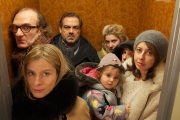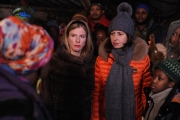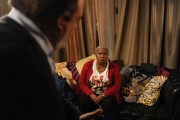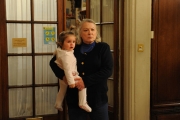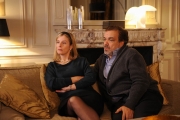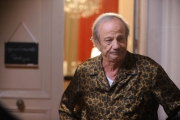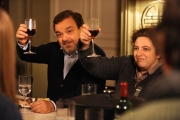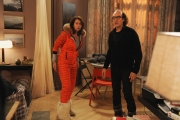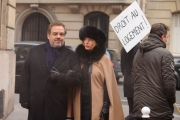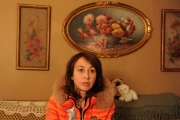![]() Presentation by and discussion with director and screenwriter Alexandra Leclère & actress Josiane Balasko
Presentation by and discussion with director and screenwriter Alexandra Leclère & actress Josiane Balasko
Winter is the worst on record. A governmental decree compels those who have the best housing to take in fellow citizens living in precarious conditions during the cold-spell. As the time for the “Great Sharing” draws near, a wave of panic spreads through a very chic Parisian building.
Cast & Crew
Director • Alexandra Leclère
Screenwriter • Alexandra Leclère
Director of Photography • Jean-Marc Fabre
Producer • Philippe Godeau
Starring :
Karin Viard, Didier Bourdon, Valérie Bonneton, Michel Vuillermoz, Josiane Balasko, Patrick Chesnais…
Choose a picture to see the filmography (source : IMDB)
![]()
Where did you get the idea of creating this film on this particular subject?
It occurred to me seven years ago, with this recurring theme found in all my films: obligations imposed on people. The necessity for solidarity. I had written the first synopsis of about a dozen pages. I submitted it to a producer who told me, “Forget it. No one would believe it; nothing like that could ever happen.” Therefore, I put the project aside for a few years to create another film, Maman, convincing myself that it was not fit to be made into a movie. And why is that? For two reasons. First, whenever I talked about the project, there was a lack of enthusiasm around me. Secondly, because there were many characters in the story, whereas I am more familiar with working on more private, intimate subjects. It also meant walking away from my favorite topics of couples and familial life. But after Maman, I wanted to come back to comedy, and as I am stubborn and believed in my story, I went for it. I wrote alone, without a contract and had [producer] Phillipe Godeau read it. He told me ‘jackpot’.
The news from the past months collides with your storyline, that you began writing seven years ago . . . Each of your characters symbolizes our little cowardices, our clear conscience, our claimed commitments, but in substance our hesitation towards welcoming underprivileged people into our homes . . .
It is very normal, just as the people of this building, we would all be rattled by this decree, this social cataclysm, right?
Faced with this situation, this obligation to host underprivileged people, your characters change over the course of the story and in the end we realize that despite their vices, they are likeable and redeemable . . .
A character should never be monolithic, or it quickly becomes boring. It is necessary to be able to see life, as well as people, from many different angles. I would like Le Grand Partage to be seen as I conceived it, a pure comedy that also brings about some teeth-grinding.
Let’s speak about your actors, you have reunited a plethora of great ones: Patrick Chesnais, Karin Viard, Didier Bourdon, Anémone, Valérie Bonneton, Michel Vuillermoz, and of course Josiane Balasko in the role of a fascist caretaker . . .
For the fascist caretaker role, I absolutely wanted Josiane Balasko, whom I had met on my film Maman. I love her as a comedian and as a woman. She alone was capable of sweetening the pill, since everyone knows her [social and political] commitments. Coming from Josiane and knowing her personal social and political engagement and activism, playing a fascist caretaker has to be seen as an ironical militant stance.
You are not used to film with large casts. How did you feel during the shooting of Le Grand Partage?
First, I was fortunate to have a cast that demonstrated exemplary solidarity. When shooting, I always anticipate my future editing needs, as well as what I will not use eventually. I can add a scene just as delete another. I sleep very little, I rewrite at night, I refine, adjust, change dialogues. To help myself with it, I have imagined a system using snapshots of the main scenes of the day that I use throughout the shooting to fit pieces together, like an enormous puzzle.
Press Kit “Le grand partage”
French ~ 17 pages ~ 548 Ko ~ pdf



